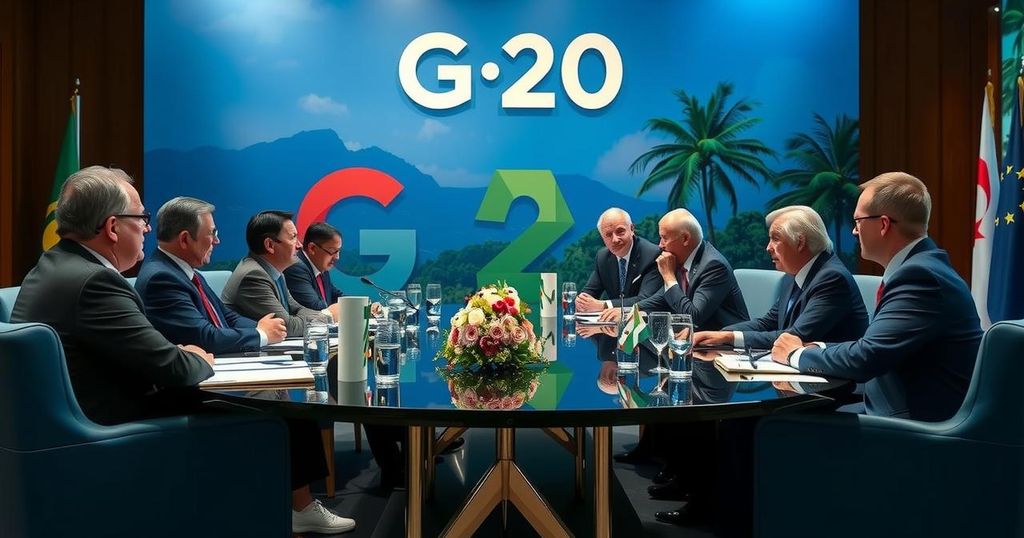G20 Leaders Focus on Climate Change at Rio Summit’s Finale

On the last day of the Rio summit, G20 leaders prioritized discussions on sustainable development and climate change, particularly in preparation for the upcoming U.N. climate talks in Azerbaijan. They emphasized the need for substantial increases in climate finance and addressed tensions regarding financial contributions from both developed and developing countries. Challenges remain, but there is a commitment to progress on issues like plastic pollution and climate finance targets.
In a bid to combat climate change, G20 leaders convened on the final day of the Rio summit to deliberate on sustainable development and the shift towards cleaner energy sources. This meeting serves as a precursor to critical discussions expected at the upcoming U.N. climate talks in Azerbaijan. Notably, there is urgency surrounding these efforts, particularly as global temperatures are set to reach unprecedented levels and with potential policy shifts anticipated following Donald Trump’s return to the U.S. presidency. During the summit, leaders emphasized the necessity of increasing climate financing dramatically, moving from billions to trillions, to adequately address the challenges posed by climate change. Discussions centered particularly on establishing a new financial target that would articulate how much developed nations should allocate in climate assistance to developing countries. However, clarity on what this resolution might entail remains uncertain, despite economists advising that a goal of at least $1 trillion annually should be set. The tension between developed and developing nations surfaced, with the former advocating for the inclusion of economically prosperous developing countries, such as China and affluent Middle Eastern nations, in the financial contributions framework. In contrast, developing nations like Brazil have resisted such moves, insisting that historical polluters from developed nations should bear the primary responsibility. Brazilian President Luiz Inacio Lula da Silva, while addressing the summit, remarked on the widespread and pressing impacts of climate change, urging for immediate collective action. The G20 nations, comprising 85% of the global economy and contributing over three-quarters of climate emissions, play a pivotal role in establishing effective responses to global warming. Additionally, the G20 affirmed its commitment to finalizing a legally binding treaty aimed at curbing plastic pollution by the end of 2024, with renewed discussions scheduled for the following week.
The G20, which consists of major economies, encompasses about 85% of the world’s GDP and significantly impacts global carbon emissions. Climate change is a pressing concern worldwide, with increasing temperatures exacerbating vulnerabilities in both developed and developing nations. The ongoing negotiations aim to enhance international collaborative efforts in addressing these environmental challenges while balancing economic interests, particularly regarding climate finance mechanisms. The upcoming COP29 climate summit in Azerbaijan is critical, as it is expected to finalize financial outlines for climate action, amidst changing political landscapes in member countries.
The G20 summit in Rio underscores the critical importance of addressing climate change through international cooperation. While significant strides have been made in advocating for increased climate finance and binding agreements on pollution, divergent views between developed and developing nations highlight ongoing challenges in achieving a unified approach. The outcomes of the G20 discussions will significantly influence the forthcoming U.N. climate talks, making the stakes particularly high as nations prepare to confront pressing global warming issues effectively.
Original Source: www.straitstimes.com






